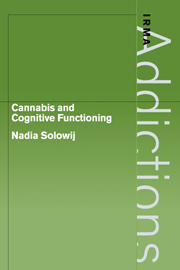Book contents
- Frontmatter
- Contents
- Series editor's preface
- Author's acknowledgements
- 1 Statement of the problem
- PART 1 A REVIEW OF THE LITERATURE
- PART 2 RESEARCH
- 7 An event-related potential study of attentional processes in long-term cannabis users
- 8 An investigation of the effects of frequency and duration of cannabis use
- 9 An investigation of the reversibility of cognitive impairment in ex-cannabis users
- 10 A single case study of cessation of cannabis use
- 11 Anxiety, psychopathology and the qualitative experience of long-term use of cannabis
- 12 Summary, synthesis and conclusions
- Appendix
- References
- Index
10 - A single case study of cessation of cannabis use
from PART 2 - RESEARCH
Published online by Cambridge University Press: 16 September 2009
- Frontmatter
- Contents
- Series editor's preface
- Author's acknowledgements
- 1 Statement of the problem
- PART 1 A REVIEW OF THE LITERATURE
- PART 2 RESEARCH
- 7 An event-related potential study of attentional processes in long-term cannabis users
- 8 An investigation of the effects of frequency and duration of cannabis use
- 9 An investigation of the reversibility of cognitive impairment in ex-cannabis users
- 10 A single case study of cessation of cannabis use
- 11 Anxiety, psychopathology and the qualitative experience of long-term use of cannabis
- 12 Summary, synthesis and conclusions
- Appendix
- References
- Index
Summary
The question of whether cognitive impairments associated with long-term use of cannabis are reversible on cessation of use has not been entirely resolved. The previous experiment assessed event-related potential (ERP) measures of selective attention in a group of ex-cannabis users, examining the effects of past duration of use and the length of abstinence. The group result suggested partial recovery of function, but there was also evidence for individual differences in the extent of reversibility of impairment. A subset of the sample (those who had used for the greatest number of years) did not differ from the current long-term cannabis users of Experiment 2 in their ERP signature reflecting unnecessary processing of complex irrelevant information. The impairment was progressive with the number of years of use in both current users and ex-users, and ex-users showed no indication of gradual improvement with increasing abstinence. It was hypothesized that if partial recovery did occur, it must occur fairly rapidly upon cessation of use.
The previous study did not assess subjects before and after the cessation of cannabis use and therefore it is not known to what extent individual subjects showed the deficit in selective attention prior to giving up, or indeed what other factors might contribute to the manifestation or resolution of such an impairment. The present study therefore was designed to investigate in detail changes in cognitive functioning following cessation of cannabis use in an individual subject.
- Type
- Chapter
- Information
- Cannabis and Cognitive Functioning , pp. 192 - 206Publisher: Cambridge University PressPrint publication year: 1998

